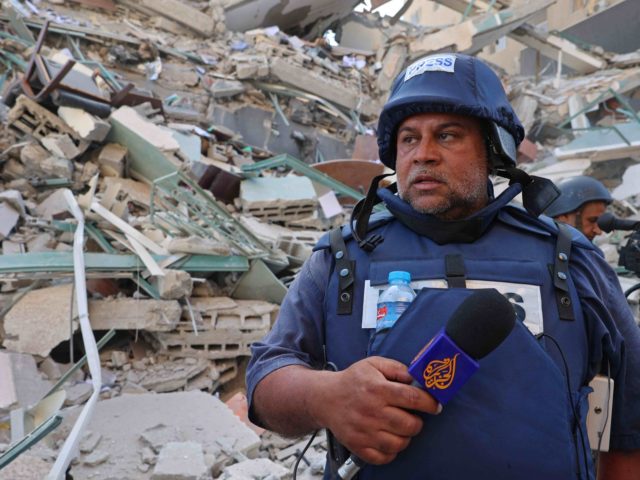The Associated Press (AP) denied any knowledge that Jala Tower, the building housing its offices in Gaza, was also shared by Hamas terrorists, as claimed by the Israeli military and Israeli Prime Minister Benjamin Netanyahu after the office block was bombed on Saturday.
AP President and CEO Gary Pruitt denied that the news organization knew Hamas was in the building. In a statement, he said:
We are shocked and horrified that the Israeli military would target and destroy the building housing AP’s bureau and other news organizations in Gaza. They have long known the location of our bureau and knew journalists were there. We received a warning that the building would be hit.
The Israeli government says the building contained Hamas military intelligence assets. We have called on the Israeli government to put forward the evidence. AP’s bureau has been in this building for 15 years. We have had no indication Hamas was in the building or active in the building. This is something we actively check to the best of our ability. We would never knowingly put our journalists at risk.
We are seeking information from the Israeli government and are engaged with the U.S. State Department to try to learn more.
Israel struck the building as Hamas fired hundreds of rockets at Israeli civilian targets on Saturday. Many were intercepted by the Iron Dome system, but least one Israeli died near Tel Aviv.
The Israel Defense Forces (IDF) tweeted: “After providing advance warning to civilians & time to evacuate, IDF fighter jets struck a multi-story building containing Hamas military intelligence assets. The building contained civilian media offices, which Hamas hides behind and deliberately uses as human shields.”
Prime Minister Netanyahu said the building was used by Hamas intelligence: “It was not an innocent building.”
On Sunday morning local time, the IDF followed up with additional tweets about the building:
The Associated Press (AP) called the attack, which destroyed one of its offices, “shocking and horrifying.” White House Press Secretary Jen Psaki tweeted: “We have communicated directly to the Israelis that ensuring the safety and security of journalists and independent media is a paramount responsibility.”
She made no mention of ever having said the same to the Palestinians.
Noah Pollak, executive director of the Democratic Alliance Initiative, claimed that the AP knew Hamas occupied the building:
In 2014, former AP Jerusalem editor Matti Friedman wrote about how Hamas manipulates and intimidates the media:
In previous rounds of Gaza fighting, Hamas learned that international coverage from the territory could be molded to its needs, a lesson it would implement in this summer’s war. Most of the press work in Gaza is done by local fixers, translators, and reporters, people who would understandably not dare cross Hamas, making it only rarely necessary for the group to threaten a Westerner. The organization’s armed forces could be made to disappear. The press could be trusted to play its role in the Hamas script, instead of reporting that there was such a script. Hamas strategy did not exist, according to Hamas—or, as reporters would say, was “not the story.” There was no Hamas charter blaming Jews for centuries of perfidy, or calling for their murder; this was not the story. The rockets falling on Israeli cities were quite harmless; they were not the story either.
…
When Hamas’s leaders surveyed their assets before this summer’s round of fighting, they knew that among those assets was the international press. The AP staff in Gaza City would witness a rocket launch right beside their office, endangering reporters and other civilians nearby—and the AP wouldn’t report it, not even in AP articles about Israeli claims that Hamas was launching rockets from residential areas. (This happened.) Hamas fighters would burst into the AP’s Gaza bureau and threaten the staff—and the AP wouldn’t report it. (This also happened.) Cameramen waiting outside Shifa Hospital in Gaza City would film the arrival of civilian casualties and then, at a signal from an official, turn off their cameras when wounded and dead fighters came in, helping Hamas maintain the illusion that only civilians were dying. (This too happened; the information comes from multiple sources with firsthand knowledge of these incidents.)
Colford, the AP spokesman, confirmed that armed militants entered the AP’s Gaza office in the early days of the war to complain about a photo showing the location of a rocket launch, though he said that Hamas claimed that the men “did not represent the group.” The AP “does not report many interactions with militias, armies, thugs or governments,” he wrote. “These incidents are part of the challenge of getting out the news—and not themselves news.”
No journalists were apparently harmed in the attack, other than the apparent loss of valuable equipment and archives.
“We narrowly avoided a terrible loss of life,” Pruitt said. Press freedom groups accused Israel of trying to censor the media.
Joel B. Pollak is Senior Editor-at-Large at Breitbart News and the host of Breitbart News Sunday on Sirius XM Patriot on Sunday evenings from 7 p.m. to 10 p.m. ET (4 p.m. to 7 p.m. PT). He is the author of the new e-book, The Zionist Conspiracy (and how to join it). His recent book, RED NOVEMBER, tells the story of the 2020 Democratic presidential primary from a conservative perspective. He is a winner of the 2018 Robert Novak Journalism Alumni Fellowship. Follow him on Twitter at @joelpollak.

COMMENTS
Please let us know if you're having issues with commenting.